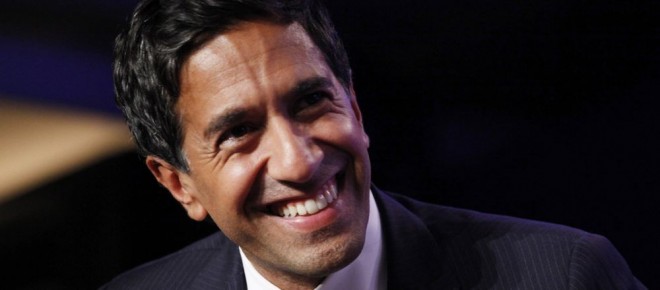In conversation: Dr. Sanjay Gupta
CNN chief medical correspondent on his new novel, medical mistakes and the Canadian health care system
Dr. Sanjay Gupta, Chief Medical Correspondent for CNN, attends the Clinton Global Initiative, Wednesday, Sept. 22, 2010, in New York. (AP Photo/Mark Lennihan)
Share

Dr. Sanjay Gupta is best known as the chief medical correspondent for CNN and as a special correspondent for CBS. He’s also a practising neurosurgeon, on the faculty at the Emory University School of Medicine in Atlanta, and the author of two bestselling books of health advice, Chasing Life and Cheating Death. Gupta has now written a novel, Monday Mornings, published last month. Its title refers to the weekly morbidity and mortality (M&M) meetings where doctors at the novel’s fictional hospital, Chelsea General, discuss recent surgeries, including instances of medical error. Gupta sat down with Maclean’s contributor Dr. Elaine Chin to discuss his novel, as well as the health care system in Canada and the United States. For more of their Q+A pick up this week’s Maclean’s magazine, on newsstands now.
Q: In your new novel, Monday Mornings, you have a number of really interesting fictional characters. Was there a personal memory of a person which you weaved into your novel?
A: One of my favorite professors was so good scientifically and such a good surgeon—I always loved being in his operating room. He was widely respected, but not always the most talkative even in those M&M (mortality and morbidity) meetings. But in one instance, there was a doctor who was presenting a case and it was clear to everybody in the room that the guy made a really reckless mistake. It’s nauseating when you realize that. This professor of mine actually got up—and again, he’s usually a quiet guy—and started reading lines about the patient. It wasn’t her obituary —which is how I wrote it in the novel—but it was all this incredibly nuanced language about who this person was and what kind of life she had led. It was just an unbelievable reminder that what we do is important and when we make a mistake, as that doctor who was presenting had, it’s about a life. I realized, he’s not only a good doctor, a good surgeon, but he’s a really good human being and I wanted to convey that in some way.
Q: Is there a mistake you see repeated that dismays you in particular?
A: In 1999 there was an Institute of Medicine report that came out and said 98,000 deaths in the U.S. were due to medical mistakes. That was 13 years ago and there’s no evidence that the numbers have gone down at all. I think part of it is that while we know what works, we don’t always implement it. It can be implemented very inconsistently. Even within hospitals, you can have different protocols floor to floor. Like one floor may have a really good hand washing protocol and the floor right below it may not. That’s within the same hospital, so imagine what it’s like in terms of the difference between communities, between States, and so forth. So, I think that the idea that some of these mistakes, which we know how to take care of, keep happening, then that’s just intolerable. The idea that mistakes happen is unsettling, but the worst kind of mistakes would be that no one learns from them.
Q: Can you comment on the Canadian health care system?
A: I’m a Michigander, and in some ways we live so close to Canada. But, I think the question is more about the U.S. health care system, because I think if you look at how an employer-based health care system developed in the United States, it’s not one of these things that you say, ‘wow that was really well thought out and here’s how we decided to do it.’ ” The U.S. health care system evolved into what it is for lots of different reasons. The relationships between unions and governments, and who was going to get what tax break. I think, at the end of the day, having a system that is more unified, made a lot of sense to just about everybody, regardless of ideology. But I think that at this point we have a health care system in the United States that is like a fast moving train. It is very hard to change if you want to make some big broad sweeping changes, and we’re seeing that first hand right now. I think the Canadian health care system, in many ways, seems much better thought out. Probably looking at the history of our country, I think if people had to do it all over again, they would have picked a model maybe that was closer to some sort of more unified system. Whether it would have been a single payer or whether it would have been government, I don’t know the answer to those questions.
Dr. Elaine Chin is a regular contributor to Maclean’s, Canadian Business, Chatelaine and CityNews.
For more Q+A with Dr. Gupta, see this week’s Maclean’s magazine, on newsstands now.